Contents
- The story of
- Description of the apple tree variety Memory of Ulyanishchev with a photo
- Characteristic of the variety
- Advantages and disadvantages
- Rules for planting an apple tree Memory of Ulyanishchev
- Care instructions
- Collection and storage of apples Memory of Ulyanishchev
- Conclusion
- Reviews of gardeners about the apple tree Memory of Ulyanishchev
The apple tree Pamyat Ulyanishchev is a new promising variety of culture, which every year is becoming more and more popular among gardeners. It is characterized by delicious juicy fruits that retain consumer properties until spring, subject to storage rules. And this completely refutes the opinion that only hard apples with a high content of solids are capable of lying for a long time. Also, the variety is characterized by undemanding care and stable yield.
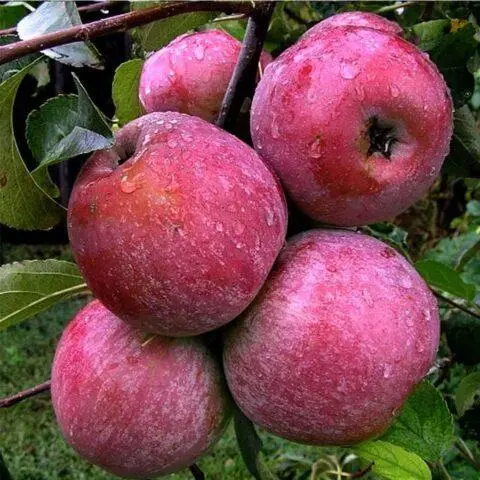
Apple tree Pamyat Ulyanishchev belongs to the category of semi-dwarf species
The story of
The breeding work was carried out at the Rossoshanskaya Zonal Horticulture Experimental Station, which is located near Voronezh. The selection was started by its founder, namely M. M. Ulyanishchev, and finished by his followers – A. M. Ulyanishcheva, O. I. Kolodiy, N. A. Polyakova.
The basis for the new species was the famous Welsey variety, which is characterized by high winter hardiness, and Kandil-Chinese, bred by Michurin. And only as a result of multi-stage selection, a seedling with stable characteristics was obtained. The variety was named in memory of an outstanding scientist.
The apple tree Pamyat Ulyanishchev was included in the State Register in 2004. And the application for variety testing was filed four years earlier.
Description of the apple tree variety Memory of Ulyanishchev with a photo
There are some features of the appearance of the tree and fruits that distinguish this apple tree from others. To be able to accurately determine compliance with the variety, you need to study them in advance.
tree appearance
The memory of Ulyanishchev is a medium-sized apple tree, the height of which reaches 3,5 m. The variety is distinguished by a rounded, slightly thickened crown, with a growth diameter of about 3 m. The branches are located close to each other, but do not intertwine. The shoot formation of the variety is weak.
The bark on the skeletal branches and the main conductor is smooth, of a rich green hue. The lenticels are round or elongated, yellowish in color, so they stand out well. The shoots at the Memory of Ulyanishchev are slightly pubescent.
The leaves are large, oblong-oval, with a pointed short top. On the edge of the plate are wavy with crenate serrations. The surface of the leaves of this apple tree is slightly shiny, slightly wrinkled. Petioles pubescent, medium length.
The memory of Ulyanishchev has a mixed type of fruiting, so apples are formed on spears, twigs, ringlets. The fruits are located close, and sometimes grow 2-3 pieces together.
The Memory of Ulyanishchev has five-petalled large white flowers. The size of the buds when opening is 3,5 cm. Their petals are tightly closed together. The pistil and stigma are on the same level. The apple tree blooms at the end of May and continues for 10-12 days.
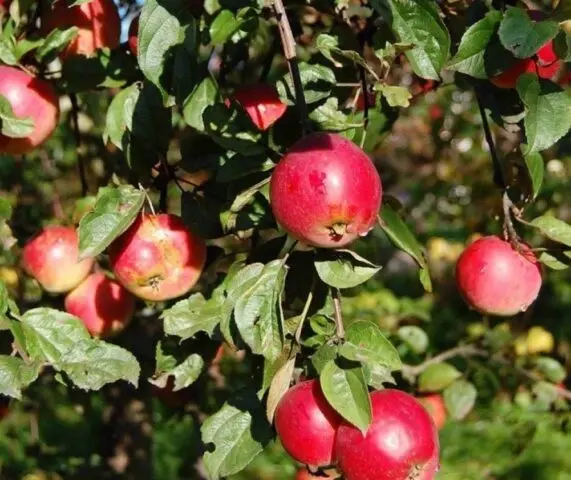
The compact shape of the tree makes it much easier to care for it.
Description of fruits
The apples of this variety are oblong-conical, regular in shape, have an attractive appearance. The main color of the fruit is greenish-yellow, but the integumentary part is red-crimson and occupies most of the surface.
Subcutaneous points near the Memory of Ulyanishchev are often located, light, large. Apples are covered with a wax coating of medium intensity. The funnel of the fruit is narrow, small in size, the calyx is closed. The stalk is short, it does not extend beyond the apple. The skin is thin, but dense, so the crop tolerates transportation well.
In the memory of Ulyanishchev, the fruits are large, their average weight is 200-220 g, and the mass of some specimens reaches 300 g. The pulp is tender, juicy, fine-grained, white in color.
Characteristic of the variety
The productivity of this variety directly depends on its characteristics. Therefore, they need to be studied, which will also help to avoid possible mistakes in tree care.
Palatability
The fruits of the apple tree Memory of Ulyanishchev have a dessert sweet taste with sourness. When ripe, apples exude a pleasant wine aroma. The tasting score of the Ulyanishchev’s Memory variety is 4,8 points out of a possible 5.
Terms of maturation
The variety of apples Memory of Ulyanishchev is considered late autumn. The fruits reach removable maturity in the second half of September. At the same time, they hold tightly to the branches and do not crumble.
Productivity
The apple tree begins to bear fruit in the fifth year after planting. The volume of the first crops is about 60 kg. But as the tree grows older, it increases and reaches about 130 kg. The harvested crop is stored for up to five months, fully preserving consumer qualities.
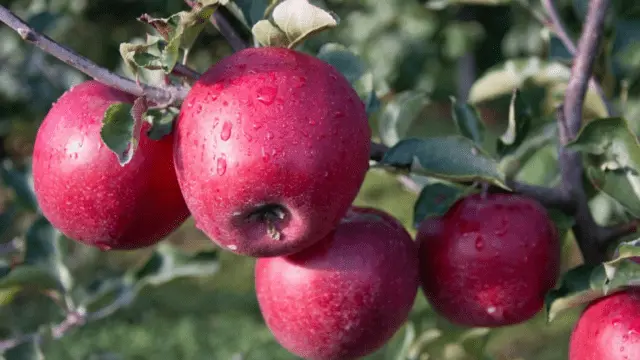
The variety maintains productivity during short-term drought.
Frost resistance of the apple tree Memory of Ulyanishchev
The memory of Ulyanishchev has a high frost resistance. The bark and shoots are able to withstand temperatures as low as -35 °C. However, the tree acquires stability in the process of growth, therefore it is recommended to warm young seedlings for the winter within three years after planting.
Pollinators of the apple tree Memory of Ulyanishchev
The memory of Ulyanishchev is a self-fertile apple tree. Therefore, the fruit set of the variety does not depend on the presence of pollinators and weather conditions during the flowering period. The productivity of the apple tree is 55-70%. To increase this level, it is recommended to plant near pollinators at a distance of no more than 10 m. They should have the same flowering period as this variety.
Growing regions
Variety Pamyat Ulyanishcheva is recommended for cultivation in the Central Black Earth region. But judging by the reviews of gardeners, it also shows high productivity in the central and southern regions. But in the latter case, the apple tree requires regular watering.
Disease resistance
The memory of Ulyanishchev has a high natural immunity. But in the case of a rainy cold summer, the leaves and fruits of the apple tree are affected by scab to an average degree. Therefore, when growing this variety, preventive treatments in spring and autumn with fungicides are recommended.
Advantages and disadvantages
This variety of culture has many advantages, which distinguishes it from the rest. But it also has certain disadvantages that you need to pay attention to.
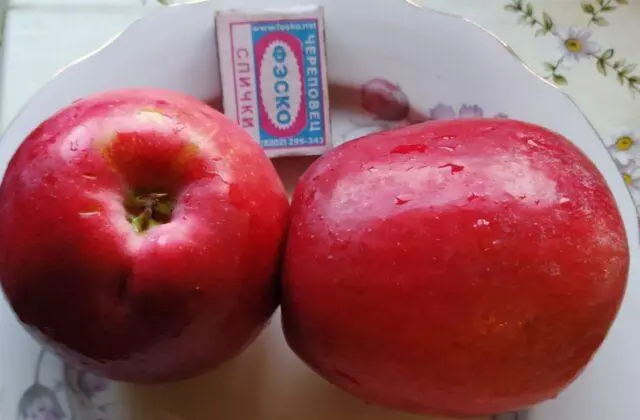
Variety “Pamyat Ulyanishcheva” bears fruit annually
Main advantages:
- precociousness;
- compact size of the tree;
- frost resistance;
- does not need pollinators;
- stable high yield;
- good presentation;
- excellent taste;
- suitable for transportation, long-term saving;
- large apples.
Disadvantages:
- requires careful harvesting;
- prone to scab, codling moth.
Rules for planting an apple tree Memory of Ulyanishchev
You can plant an apple tree of this variety in a permanent place in spring at the end of April and in autumn – at the beginning of October. For the Memory of Ulyanishchev, you need to choose a sunny open place, protected from cold gusts of wind. The best option is the south and east sides of the garden. At the same time, the groundwater level on the site must be at least 2 m.
At least two weeks before planting, it is necessary to prepare the hole and fill it to the top with nutrient soil mixture. It should consist of turf, humus, sand, leafy soil in a ratio of 2: 1: 1: 1. Also, in addition to the planting pit, you need to add 40 g of superphosphate and 25 g of potassium sulfide and mix the fertilizer thoroughly with the ground.
Procedure:
- Make an elevation in the center of the hole.
- Install a wooden support nearby.
- Put a seedling on a mound and gently straighten its roots.
- Liberally pour.
- Sprinkle the roots with earth, periodically shaking the apple tree to fill in any voids.
- Compact the soil at its base.
- Tie the seedling to the support with soft twine.
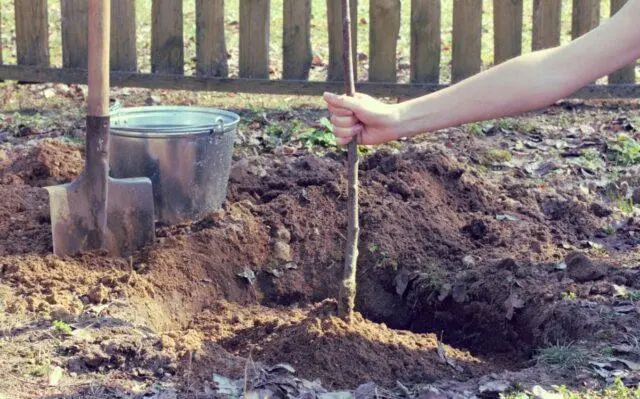
The root neck of the apple tree after planting should be at the level of the soil
Care instructions
At first, it is necessary to constantly monitor the soil moisture in order to prevent the roots from drying out. Therefore, it is recommended to water the apple tree twice a week. After a month, the breaks between moisturizing should be doubled.
An adult apple tree, Memory of Ulyanishchev, needs to be watered three times a season in the absence of rain, namely during the period of budding, ovary formation and fruit ripening. In this case, it is necessary to carry out moistening in the evening along the perimeter of the crown with wetting the soil up to 10 cm.
Variety “Pamyat Ulyanishcheva” responds well to top dressing. They need to be carried out three times per season. It is recommended to apply fertilizers for the first time at the beginning of the growing season, using urea or ammonium nitrate at the rate of 30 g per 10 liters of water. In the future, top dressing is recommended after flowering and during fruit set. During these periods, the use of superphosphate 40-100 g and potassium sulfide 25-80 g per 10 liters of water is relevant.
The crown of an apple tree is recommended to be formed in the first 2-3 years after planting. For the Memory of Ulyanishchev variety, a sparse-tiered scheme is suitable. Pruning in this case should be done in the spring.
In the future, it is only necessary to clean the crown of the tree from broken and damaged shoots. Ulyanishchev’s Memory does not need a cardinal pruning due to a small annual increase.
In late autumn, a layer of humus 10 cm thick must be laid in the root circle of young seedlings. At the same time, it should not come into contact with the bark, as it can cause it to warm up during thaws.
Collection and storage of apples Memory of Ulyanishchev
Harvesting must be done carefully, as apples have a juicy tender texture. It is recommended to remove them from the tree in the morning in dry, clear weather, along with the petioles. For long-term storage, the fruits should be put in wooden boxes, wrapped in paper. Optimal conditions for saving: temperature +2-4 °С and humidity about 65%.
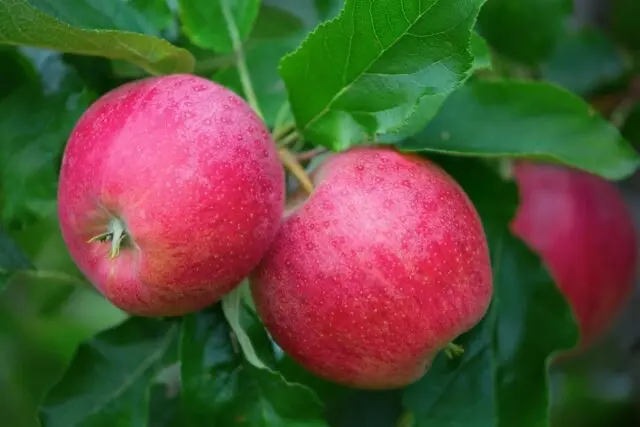
Harvest acquires a balanced taste two weeks after harvest
Conclusion
Apple tree Memory of Ulyanishchev is ideal for frequent cultivation. It does not take up much space on the site, but gives a generous harvest annually. At the same time, the variety does not require complex care. Therefore, even a novice gardener will cope with its cultivation.









